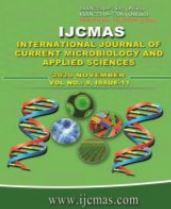


 National Academy of Agricultural Sciences (NAAS)
National Academy of Agricultural Sciences (NAAS)

|
PRINT ISSN : 2319-7692
Online ISSN : 2319-7706 Issues : 12 per year Publisher : Excellent Publishers Email : editorijcmas@gmail.com / submit@ijcmas.com Editor-in-chief: Dr.M.Prakash Index Copernicus ICV 2018: 95.39 NAAS RATING 2020: 5.38 |
Global consciousness of food safety, health and environmental issues has stimulated interest in alternative agricultural systems like organic farming. Since information on organic farming of tuber crops is meagre, a field experiment was conducted in over a three-year period at Department of Vegetable Crops, Horticultural College and Research Institute, Tamil Nadu Agricultural University, Coimbatore. The aims were to evaluate the impact of organic, conventional and traditional production systems on yield, proximate composition and mineral content of tubers and soil physico-chemical and biological properties in greater yam (Dioscorea alata). Organic farming (35.14 t ha-1) produced significantly higher yield over conventional practice (28.17 t ha-1) by 24%. A net profit of Rs 3,16,534 ha-1, which was 38% higher over chemical based farming was obtained under organic management in greater yam Tuber quality was improved with slightly higher dry matter, starch and crude protein contents. Thus organic farming was found to be an eco-friendly management strategy in yams for sustainable yield of quality tubers besides maintaining soil health. Technology involving farmyard manure, green manuring, neem cake, biofertilizers and ash was standardized.
 |
 |
 |
 |
 |